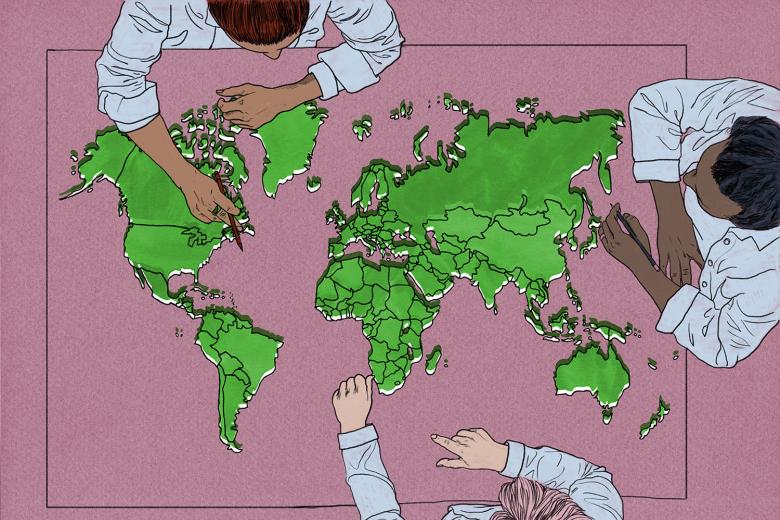De verborgen kosten van lage prijzen
When prices shrink, does our empathy for salespeople shrink with them? Are we more likely to belittle a Ryanair flight attendant than one in a Lufthansa uniform? The answer, it appears, may be yes. Research carried out at Maastricht University’s School of Business and Economics indicates that consumer bargains can carry a hidden cost for the employees of the retailers whose low, low prices are their USP.

Based on Alexander Henkel’s award-winning doctoral research at SBE and forthcoming in the Journal of Consumer Psychology, “Discounting Humanity: When Consumers are Price Conscious, Employees Appear Less Human” draws on four studies to highlight the “everyday dehumanization” of price-conscious shopping. Henkel and his co-authors – SBE alumnus Johannes Boegershausen, JoAndrea Hoegg, Karl Aquino and Jos Lemmink, professor of marketing and former dean of SBE – contend that “under certain circumstances consumers do not fully recognize the humanness of employees”.
Across the four studies, the researchers found that consumers focused on bargains used fewer humanising words in online reviews of discount airlines than of traditional carriers, judged people in uniform according to the price “status” of their employers, and were 18 per cent more likely to “punish” low-cost firms’ customer service representatives with consequence-bearing complaints in an online chat environment. Were Lemmink and Henkel, now a postdoctoral research fellow at the BISS Institute, dismayed at what they saw?
“We found that a price conscious mentality can lead consumers away from fully recognising the human qualities of employees, and the findings also suggest that this subtle form of dehumanization can result in harsher treatment of employees when they provide less than satisfactory service. These results were certainly dejecting with the well-being of service employees in mind,” Henkel and Lemmink say.
Bargain hunters’ blind spots
It is when consumers are in the midst of making purchase decisions where price is the key factor that they are the least willing to see staff as human, suggest the authors. But might this habit stick?
“We investigated a price conscious mentality as a transitory state, rather than a stable trait characteristic,” the scholars clarify. “We find that when consumers encounter low-price signals (eg, brands highlighting low prices, discounts, and sales promotions), they may adopt a price conscious mentality, that is, a singular focus on getting the cheapest deal. Such a focus can lead consumers away from fully recognising the human qualities and result in harsher treatment of employees when they provide less than satisfactory service. Whether this effect is cumulative and linearly increasing is possible, but we did not investigate this and can only speculate at this point.”
If “brands solely emphasising low prices also signal the diminished personal merit of individuals associated with such offerings”, as the paper suggests, does this mean that among the ways discount firms tend to treat employees badly (including low wages, poor work conditions and hostility to trade unions) we should include their complicity in dehumanisation at consumers’ hands?
How much is humanity worth?
Henkel, who won the prestigious SERVSIG (American Marketing Association) Best Dissertation Award in Service Research in 2016 for the work on which this paper is based, concurs with Lemmink, his co-author and doctoral supervisor, that “it is a widely held belief that discount brands treat their employees more poorly than non-discount brands. However, there are examples in the marketplace, such as ALDI, that show the exact opposite pattern. While we would refrain from generalising on this aspect, yes, probably we should include the firms’ complicity in knowingly activating a price-conscious mentality in consumers via advertising and the brand’s positioning, at the expense of considerate treatment of their own employees.”
“Inconsiderate customer treatment is not only harmful to the psychological and even physical well-being of employees, but it can hurt the firm’s bottom line. Thus, it seems to be more of a question of making companies aware of the adverse effects of a price conscious mentality and showing up the benefits of counteracting it. This leads to a rather cynical question: how much is a social and considerate customer-employee interaction worth from a company’s perspective?”
Morality and the market
Critics of neoliberalism would argue that this research has political implications. Would Henkel and Lemmink agree?
“As scientists, we conduct objective investigations of phenomena that we identify as relevant for the theoretical development of our field and for practical merit. We leave it up to up to industry, consumers, politics, and society at large to act on our findings and recommendations.
“However, we live in a market economy with all its advantages and disadvantages. The effect of the price conscious mentality that we identified contributes to the existential debate in the social sciences about the relation between the market and morality.
“Morality, at least as practiced in democratic societies, rests on the full appreciation of others’ humanness. Notably, thought leaders from diverse disciplines from sociology to economics have identified the market as being a critical force for shaping the kind of morality that a culture embraces. We have to ask ourselves about what kind of morality we see for the future of our society. It doesn’t take much to be humane and to treat others accordingly.”
Photo: LateNameGuys
Lees ook
-
Eerlijk omgaan met data van kleine boeren
De opkomst van compliance-rapportage om de lucratieve koffie- en cacaohandel duurzamer te maken, betekent dat miljoenen kleine boeren waardevolle data genereren. Wiens eigendom zijn deze data en wie zou er de vruchten van moeten plukken? Sidi Amar, Fair & Smart Data Spearhead bij SBE, en zijn team...

-
Een duurzame wereldreis als sabbatical
Carolin Muschalik en Lukas Figge-Muschalik leerden elkaar in 2014 kennen in Maastricht. Lukas was in d eindfase van zijn PhD, Carolin van haar master. Ze werden een stel en precies een jaar geleden vertrokken ze voor onbepaalde tijd op wereldreis. Uit nieuwsgierigheid en voor de lol, maar ook om...

-
Brede international classroom biedt toegevoegde waarde
Voorlopig komt er geen beperking op de instroom van buitenlandse studenten in Nederlandse universiteiten. Gelukkig, menen onderzoekers Carla Haelermans van de School of Business and Economics (SBE) en Patrick Bijsmans van de Faculty of Arts and Social Sciences (FASoS) van Universiteit Maastricht op...
